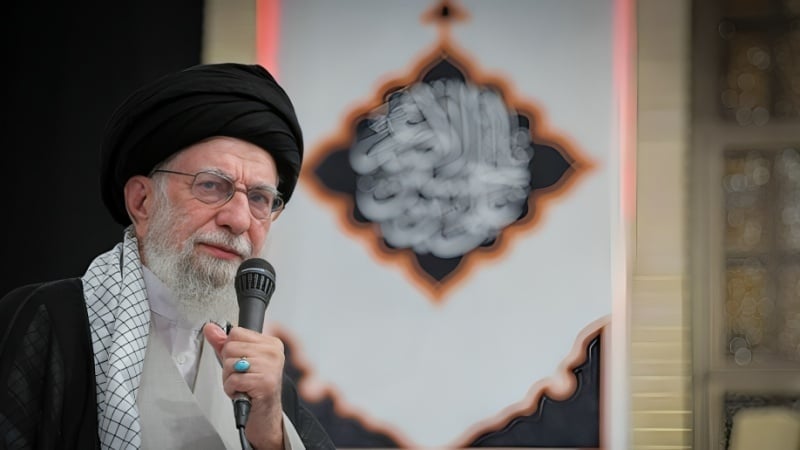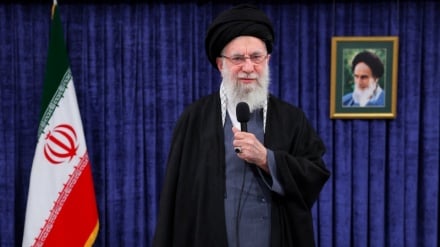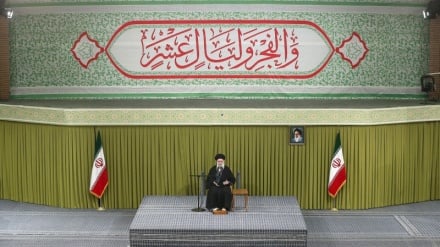What are the West’s true objectives regarding Iran?
-

Ayatollah Seyyed Ali Khamenei, the Leader of the Islamic Revolution
Pars Today – Foreign media, while covering the recent remarks of the Leader of the Islamic Revolution, paid particular attention to the part in which he emphasized that "the nuclear program, uranium enrichment, and human rights are just pretexts; what they truly seek is your faith and your knowledge."
According to Pars Today, Ayatollah Seyyed Ali Khamenei, the Leader of the Islamic Revolution, on Tuesday, July 29, during a ceremony commemorating the martyrs of the 12-day imposed war by the Zionist regime against Iran, stressed that Islamic Iran is founded upon “faith” and “knowledge.” In the establishment of the Islamic Republic, these two elements—faith and knowledge—have been the primary foundational pillars. It is precisely because of this that the people's religion and the youth’s scientific capabilities have been able to force the enemy to retreat in many different arenas. And this will continue to be the case in the future.
The Leader elaborated on the true reasons behind the West’s hostility toward Iran, stating:
“What global arrogance—headed by the criminal United States—is truly opposed to is your faith and your knowledge. They oppose your religion. They oppose this widespread faith among the people. They oppose the unity forged under the banner of Islam and the Qur’an. And they oppose your knowledge. The fact that, since the victory of the Revolution, Iran’s population has doubled, yet the number of university students has increased by nearly tenfold or more—that infuriates them. The fact that the Islamic Republic has been able to present new perspectives in various fields of knowledge—be it the humanities, technical sciences, or religious studies—this disturbs them. This is what they are truly opposed to. All that talk about the nuclear issue, uranium enrichment, human rights, and similar matters is just a pretext; the core issue lies elsewhere.”
The recent remarks of the Leader of the Islamic Revolution once again shows the true nature of Western—particularly American—hostility toward the Islamic Republic of Iran, often aligned with that of the Zionist regime. The United States and its Western allies have repeatedly accused Iran of a range of issues, including its nuclear capabilities—especially uranium enrichment—alongside claims of human rights violations and allegations of supporting terrorism, particularly across West Asia.
Apart from the fact that Western powers routinely apply double standards in dealing with other nations and governments, their constant fabrication of pretexts against Iran—and their pursuit of leverage to exert pressure or even justify potential military action—demonstrates that the U.S., its allies like the European troika, and the Zionist regime fundamentally have a problem with the very nature of the Islamic Republic. They simply cannot tolerate its continued existence.
Interestingly, the highly significant and strategic remarks of the Leader of the Islamic Revolution, in explaining the true reasons behind Western hostility toward Iran, have also drawn the attention of Western think tanks.
The Foundation for Defense of Democracies (FDD), a think tank closely aligned with the U.S. House of Representatives, analyzed the Leader’s remarks and wrote: “Ayatollah Khamenei accused the West of using the nuclear issue as a pretext to weaken the Islamic Republic.” The FDD’s website interpreted the Leader’s statements as a clear sign that Iran has no intention of halting its uranium enrichment program and remains determined to continue supporting the Resistance Axis in the region, while also rebuilding its nuclear and missile capabilities.
The think tank concluded that the Leader’s latest statements make it clear that the 12-day imposed war had no impact on Iran’s approach to nuclear or regional issues.
Over the past four decades since the victory of the Islamic Revolution and the establishment of the Islamic Republic, Iran has taken major strides toward self-sufficiency and the development of domestic capabilities. It has significantly reduced its reliance on foreign countries in strategic sectors such as oil and gas, petrochemicals, heavy industries, and other industrial domains.
On the other hand, young Iranian scientists and researchers have achieved remarkable breakthroughs in advanced technologies such as nanotechnology, stem cell research, and the space industry. Iran has also made impressive strides in the path of scientific and academic development.
The enhancement of the society’s scientific level, the rise in literacy rates, the expansion of academic centers in schools and universities, the increase in the number of students across various scientific fields, Iran’s leading position in the number of scientific publications and citations, the registration of patents, and its excellence in nanotechnology, nuclear science, space technology, and stem cell research are among the most important scientific and technological achievements of the Islamic Republic of Iran.
A significant increase in the number of universities is also considered another key indicator of scientific growth in Iran. While the number of universities in the country stood at around 15 before the Islamic Revolution, today it has surpassed 2,640 institutions.
The sharp rise in the number of university students is yet another measure of Iran’s scientific development in the years following the Revolution. Whereas the total number of university students before the Revolution did not exceed 155,000, today more than 4.2 million students are pursuing higher education in Iran.
Moreover, the West is deeply concerned that the Islamic Republic of Iran— as a religious society that has made remarkable progress in various fields— might gain global attention and recognition.
The advancements of the Islamic Republic of Iran following the victory of the Islamic Revolution have been so significant that even its adversaries have acknowledged them and cannot deny their reality.
Iran’s scientific progress and its achievements in certain cutting-edge technologies have been so astonishing and unexpected that they have deeply alarmed the West—especially the United States. This concern has led to increased pressure, sabotage efforts, sanctions, and more recently, the launching of an imposed war under various pretexts, including the nuclear issue.
In truth, the enemies of the Islamic Republic are deeply fearful of Iran’s rapid advancements and growing capabilities—in areas such as the economy and trade, science and technology, society and culture, as well as its dynamic foreign policy and its strong military deterrence. This fear is precisely what has fueled their escalating hostility toward Iran.
MG


